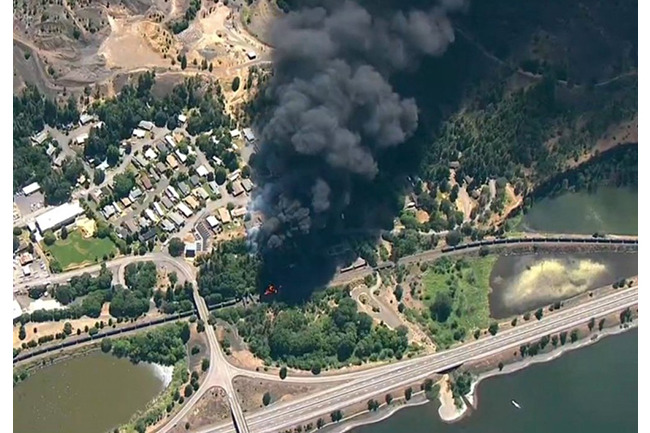For Immediate Release June 3, 2016
Contact: Michael Lang, Conservation Director, Friends of the Columbia Gorge 503-490-3979
Arlene Burns, Mayor of Mosier, OR 541-399-6780
This morning, an oil train derailment occurred in the town of Mosier in the heart of the Columbia River Gorge National Scenic Area, a derailment that continues to threaten the community as two or more tanker cars are ablaze and could be on fire for days.
“Our thoughts go out to the town of Mosier for this catastrophe, but this is not an accident,” said Michael Lang, Conservation Director of Friends of the Columbia Gorge. “This is the expected outcome of Union Pacific intentionally bringing more and more oil trains through the Columbia River Gorge National Scenic Area."
Friends of the Columbia Gorge first alerted the media in April 2014 that Union Pacific was shipping oil through the Gorge one week after Union Pacific officials denied that any oil trains were moving along their tracks. Since that time, the community of Mosier has been one of the most vocal in opposing oil-by-rail transport. Mosier Mayor Arlene Burns spoke about how the concerns that have been raised to Union Pacific are now playing out in her community. “That’s what we’ve been saying all along,” said Burns. “These trains are dangerous and we have no way to protect ourselves. This could annihilate the whole town.”
Rather than limiting danger, Union Pacific is pushing to expand oil-by-rail transport in the Gorge. Union Pacific is proposing construction of four miles of mainline track through the Columbia River Gorge National Scenic Area around Mosier. This would allow more, long oil trains traveling at higher speeds to pass through the Gorge, impacting recreation sites, wetlands, Native American cultural resources, and communities like Mosier. The proposed new track would pass through some of the most ecologically sensitive lands in the Columbia Gorge. It would also facilitate long, heavy trains traveling at high speeds carrying crude oil bound for terminals proposed throughout the Northwest. This includes the Tesoro Savage oil terminal proposal in Vancouver, potentially the largest oil-by-rail terminal in North America.
Union Pacific has submitted the application for the new track to the Wasco County Planning Commission, but claim it is a voluntary courtesy and that federal law preempts any local authority from stopping them. This ignores the fact that the National Scenic Area Act is also federal law. A hearing scheduled for June 7 has been delayed until July 5 due to the concerns raised by citizens, communities and tribes.
“Derailments like what we just saw in Mosier confirms what Gorge communities have said all along: that oil-by-rail is unsafe, said Peter Cornelison, Friends of the Columbia Gorge field representative and Hood River resident. “The Columbia River Gorge National Scenic Area and our communities are no place to transport dangerous oil by rail. This is Exhibit A for why the Tesoro oil-by-rail terminal must be denied. As the largest oil terminal in North America, it would result in a massive increase in oil transport, further endangering our communities.”
***

